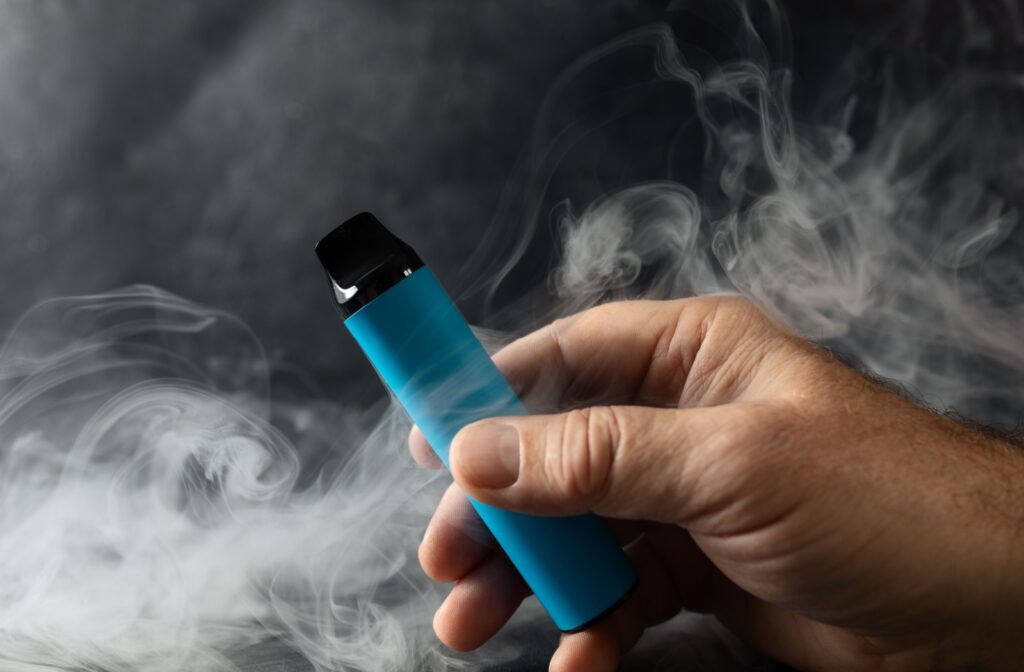In recent years, vaping has surged in popularity–particularly among younger demographics–as a perceived safer alternative to traditional cigarette smoking. While the long-term health effects of vaping are still under investigation, one area of concern that warrants immediate attention is oral health. Specifically, how does vaping impact your teeth and gums? Let’s explore the evidence and look at what may come up during your next teeth cleaning appointment to understand the potential dental risks associated with vaping.
What is Vaping?
Vaping involves inhaling and exhaling vapor produced by an electronic cigarette (e-cigarette) or similar device. The liquid in these devices, often called e-liquid or vape juice, typically contains nicotine, flavorings, and other chemicals. Although vaping eliminates many of the harmful byproducts of combustion found in traditional cigarettes, it is not without its own set of health risks.
The Impact on Oral Health
Dry Mouth (Xerostomia)
Vaping can lead to a condition where saliva production is reduced. Saliva is crucial for maintaining oral health, as it helps not only to neutralize acids, but also to wash away food particles and provide disease-fighting substances throughout the mouth. A lack of adequate saliva can result in an increased risk of tooth decay, gum disease, and oral infections.
Nicotine Effects
Nicotine, whether ingested through smoking or vaping, can contribute to gum disease. More specifically, nicotine restricts blood flow to the gums, which impairs the delivery of essential nutrients and oxygen. This slows down the healing process and makes the gums more susceptible to infections.
Increased Bacterial Growth
Studies have shown that vaping can alter the natural bacterial balance in the mouth. Such a change in the oral microbiome can lead to an increase in harmful bacteria, which may then cause tooth decay, gum disease, and/or bad breath.
Enamel Erosion
Some e-liquids contain acidic flavorings which can erode tooth enamel over time. Enamel is the hard, outer surface layer of your teeth that protects them from decay. Once it is worn away, it does not regenerate, leading to increased tooth sensitivity and a higher susceptibility to cavities.
Gum Inflammation and Disease
Vaping has been associated with increased inflammation in the gums. Chronic inflammation is a precursor to periodontitis, a severe form of gum disease that can result in tooth loss if left untreated.
Teeth Staining
While vaping is less likely to stain teeth compared to traditional cigarettes, some e-liquids contain colorants that can still lead to discoloration over time.

The Research
Although vaping is a relatively new phenomenon and long-term studies are still ongoing, existing research highlights significant concerns regarding the impact of vaping on oral health.
- A study found that e-cigarette aerosol exposure resulted in an increased inflammatory response in gingival tissues.
- Another study indicated that vaping could cause DNA damage in oral epithelial cells, potentially leading to cancer.
The Way Towards Oral Health
While vaping might be less harmful than traditional smoking in some respects, it is far from safe, especially for your teeth and gums. The potential for dry mouth, nicotine-related gum disease, enamel erosion, increased bacterial growth, and other oral health issues should not be underestimated. If you’re concerned about your oral health, the best course is to avoid vaping and to seek healthier alternatives for managing nicotine cravings.
Remember–your smile is one of your most valuable assets. To learn more about the effects of vaping on your oral health, book an appointment with Hometown Dental. Protect yourself–and your mouth and gums–by seeking regular professional dental care and making informed choices about your habits.





